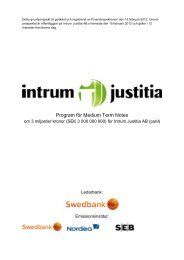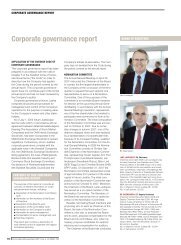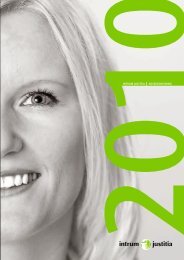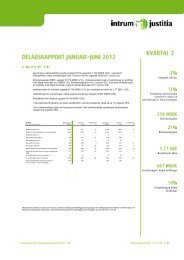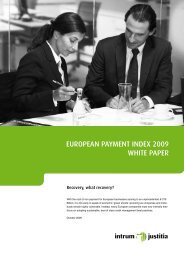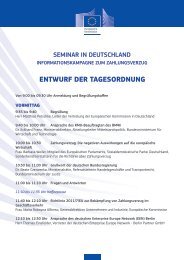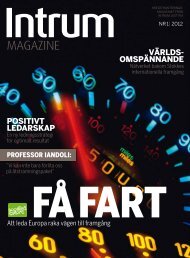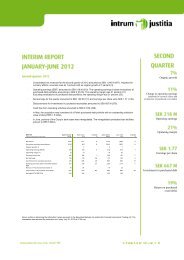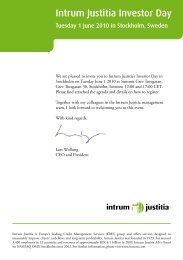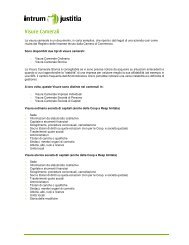ANNUAL REPORT INTRUM JUSTITIA A N N U A L R EP O R T 2 0 ...
ANNUAL REPORT INTRUM JUSTITIA A N N U A L R EP O R T 2 0 ...
ANNUAL REPORT INTRUM JUSTITIA A N N U A L R EP O R T 2 0 ...
You also want an ePaper? Increase the reach of your titles
YUMPU automatically turns print PDFs into web optimized ePapers that Google loves.
74<br />
Notes<br />
Market risk<br />
Market risk consists of risks related to changes in exchange rates and interest<br />
rate levels.<br />
Exchange rate risk<br />
Exchange rate risk is the risk that fluctuations in exchange rates will negatively<br />
affect the Group’s income statement, balance sheet and/or cash<br />
flows. The most important currencies for the Intrum Justitia Group, other<br />
than Swedish kronor (SEK), are euro (EUR), Swiss francs (CHF), British<br />
pounds (GBP) and Norwegian kroner (NOK).<br />
The following exchange rates have been used to translate transactions in<br />
foreign currency in the financial accounts:<br />
Average Average<br />
Currency Dec 31 2010 Dec 31 2009 2010 2009<br />
EUR 8.99 10.32 9.54 10.62<br />
CHF 7.21 6.94 6.91 7.03<br />
GBP 10.54 11.44 11.13 11.93<br />
NOK 1.15 1.24 1.19 1.22<br />
Exchange rate risk can be divided into transaction exposure and translation<br />
exposure. Transaction exposure consists of net operating and financial<br />
receipts and disbursements in different currencies. Translation exposure<br />
consists of the effects from the translation of the financial reports of foreign<br />
subsidiaries and associated companies to SEK.<br />
Transaction exposure<br />
In each country, all revenues and most operating expenses are denominated<br />
in local currencies, and thus currency fluctuations have only a limited<br />
impact on the company’s operating earnings in local currency. National<br />
operations seldom have receivables and liabilities in foreign currency. Revenues<br />
and expenses in national currency are thereby hedged in a natural<br />
way, which limits transaction exposure. The currency exposure that arises<br />
within the operating activities is limited to the extent it pertains to international<br />
collection operations. All major known currency flows are hedged on<br />
a continuous basis in the Group and the Parent Company through forward<br />
exchange contracts. The subsidiaries’ projected flow exposure is not hedged<br />
at present, however.<br />
Translation exposure<br />
Intrum Justitia operates in 22 countries. The results and financial position<br />
of subsidiaries are reported in the relevant foreign currencies and later<br />
translated into SEK for inclusion in the consolidated financial statements.<br />
Consequently, fluctuations in the SEK exchange rate against these currencies<br />
affect the Group’s revenues and operating earnings, as well as equity<br />
and other items in its financial statements.<br />
The Group’s revenues and earnings in SEK are affected by fluctuations<br />
in exchange rates when subsidiary earnings are translated from local currency<br />
to SEK. The Group’s revenues are distributed by currency as follows:<br />
SEK M 2010 2009<br />
SEK 585.4 545.6<br />
EUR 2,298.7 2,620.7<br />
CHF 484.4 499.1<br />
GBP 57.3 130.3<br />
NOK 96.4 95.6<br />
Other currencies 243.8 236.5<br />
Total 3,766.0 4,127.8<br />
An appreciation of the Swedish krona of 10 percentage points on average<br />
in 2010 against the Euro would thus have affected revenues with SEK<br />
–229.9 M, against CHF with SEK –48.4 M, against GBP with SEK –5.7 M<br />
and against NOK with SEK –9.6 M.<br />
Shareholders’ equity in the Group, excluding minority interests, is<br />
distributed with net assets by currency as follows:<br />
SEK M 2010 2009<br />
SEK 1,220.2 1,241.7<br />
EUR 2,719.5 2,857.4<br />
– less EUR hedged through foreign currency<br />
loans<br />
–1,343.4 –2,250.3<br />
CHF 381.4 481.1<br />
– less CHF hedged through foreign<br />
currency loans<br />
–791.9 –<br />
GBP 45.3 59.1<br />
NOK 241.0 156.8<br />
Other currency 104.3 2.9<br />
Total 2,576.4 2,548.7<br />
The exposure to CHF was temporarily double hedged over the year-end. An<br />
appreciation of the Swedish krona of 10 percentage points as per 31 December<br />
2010 against the Euro would have affected shareholders’ equity in the Group<br />
with SEK –137.6 M, against CHF with SEK +41.0 M, against GBP with<br />
SEK –4.5 M and against NOK with SEK –24.1 M.<br />
Interest rate risks<br />
Intrum Justitia has a strong cash flow which gives the Group the option of<br />
repaying loans or investing in overdue receivables. The Group’s loans have<br />
short fixed interest terms, usually between three and six months.<br />
A one-percent increase in market interest rates would have adversely<br />
affected net financial items by approximately SEK 21.3 M. A five-percent<br />
would have adversely affected net financial items by SEK 106.5 M.<br />
No derivatives were used to hedge interest rate risks in 2009–2010.<br />
Financing risk<br />
Consists of the risk of a loss or higher than expected costs to ensure the Group’s<br />
ability to fulfill its short- and long-term payment obligations to outside parties.<br />
The Group’s long-term financing risk is minimized through long-term financing<br />
in the form of committed lines of credit. The Group’s objective is that<br />
at least 35 percent of total committed loans have a remaining maturity of at<br />
least three years and that not more than 35 percent of the total have a remaining<br />
maturity of less than 12 months.<br />
Since 2010 the Group has a syndicated loan facility of EUR 310 M from<br />
Nordea, and Swedbank with availability to March 2013.<br />
While available, the facility was utilized by the Parent Company, which<br />
withdrew amounts in various currencies, with short maturities, usually SEK<br />
and three or six months. The loan was carried primarily in foreign currency,<br />
mainly EUR, to hedge the Group against translation exposure in relation to<br />
net assets outside Sweden.<br />
The Group’s loan facility has a number of operational and financial conditions,<br />
including limits on certain key financial indicators such as debt divided<br />
by shareholders’ equity and debt divided by operating earnings before depreciation<br />
and amortization. The Group Management Team carefully monitors these<br />
key financial indicators, so that it can quickly take measures if there is a risk that<br />
a limit may be exceeded. If the limits are exceeded the loans fall due.<br />
The Group’s aim is that the liquidity reserve, which consists of cash, bank<br />
balances, short-term liquid investments and the unutilized portion of committed<br />
lines of credit, amounts to at least ten percent of the Group’s annual<br />
revenues.<br />
Credit risk<br />
Consists of the risk that Intrum Justitia’s counterparties are unable to fulfill<br />
their obligations to the Group. Financial assets that potentially subject the<br />
Group to credit risk include cash and cash equivalents, accounts receivable,<br />
purchased debt, outlays on behalf of clients, derivatives and guarantees.<br />
Liquid assets<br />
The Group’s cash and cash equivalents consist primarily of bank balances and<br />
other short-term financial assets with a remaining maturity of less than three<br />
months. The Group has deposited its liquid assets with established financial<br />
institutions where the risk of loss is considered remote.




